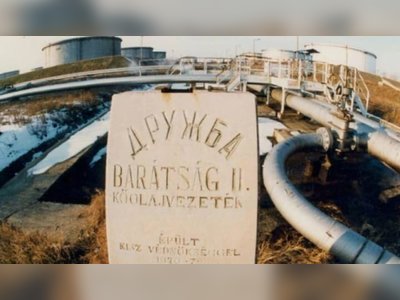
Hungary's Economic Outlook Amid Global Uncertainty
Assessing Hungary's economic position in light of recent global challenges and trends.
Hungary is navigating a complex economic landscape characterized by fluctuating inflation rates, shifts in consumer spending, and global supply chain disruptions.
Recent data indicates that Hungary's inflation rate, which peaked significantly in 2022, has shown signs of easing but remains above the European Union average.
In August 2023, inflation was recorded at 11.7%, down from the previous year, largely driven by a decrease in energy prices and adjustments in food costs.
Consumer confidence has experienced notable fluctuations, influenced by rising costs of living and economic uncertainty.
Reports suggest that consumer spending has softened, reflecting cautious behavior among households.
The Hungarian Central Statistical Office has highlighted that retail sales volume decreased in several key sectors, including non-food retail, as consumers prioritize essential goods.
On the employment front, the labor market remains relatively robust despite external pressures.
The unemployment rate in Hungary stands at approximately 3.7%, which is lower than the EU average.
This stability is supported by the government's initiatives aimed at promoting job creation and skills development.
In terms of foreign trade, Hungary's exports have been affected by the global economic environment, particularly with major trading partners facing economic headwinds.
The country relies heavily on exports, constituting a significant portion of its GDP. Industrial production, especially in sectors like automotive and electronics, continues to play a vital role in maintaining economic activity.
Government policies aimed at tackling inflation and supporting businesses have been implemented, including price caps on essential goods and energy resources.
The Hungarian government has also been focusing on increasing investments in green energy and technology sectors to enhance sustainability and economic resilience.
Hungary's geopolitical positioning continues to be significant, particularly concerning its relations with the European Union and neighboring countries.
Ongoing discussions regarding energy independence and security are central to Hungary's strategic planning, especially in the context of supply chain vulnerabilities exposed by recent global events.
As Europe faces headwinds from geopolitical tensions and economic instability, Hungary's government is actively seeking to align its economic policies with broader EU strategies aimed at fostering growth and stability.
The ongoing recovery from the COVID-19 pandemic remains a priority, alongside addressing the challenges posed by climate change and digital transformation.
Recent data indicates that Hungary's inflation rate, which peaked significantly in 2022, has shown signs of easing but remains above the European Union average.
In August 2023, inflation was recorded at 11.7%, down from the previous year, largely driven by a decrease in energy prices and adjustments in food costs.
Consumer confidence has experienced notable fluctuations, influenced by rising costs of living and economic uncertainty.
Reports suggest that consumer spending has softened, reflecting cautious behavior among households.
The Hungarian Central Statistical Office has highlighted that retail sales volume decreased in several key sectors, including non-food retail, as consumers prioritize essential goods.
On the employment front, the labor market remains relatively robust despite external pressures.
The unemployment rate in Hungary stands at approximately 3.7%, which is lower than the EU average.
This stability is supported by the government's initiatives aimed at promoting job creation and skills development.
In terms of foreign trade, Hungary's exports have been affected by the global economic environment, particularly with major trading partners facing economic headwinds.
The country relies heavily on exports, constituting a significant portion of its GDP. Industrial production, especially in sectors like automotive and electronics, continues to play a vital role in maintaining economic activity.
Government policies aimed at tackling inflation and supporting businesses have been implemented, including price caps on essential goods and energy resources.
The Hungarian government has also been focusing on increasing investments in green energy and technology sectors to enhance sustainability and economic resilience.
Hungary's geopolitical positioning continues to be significant, particularly concerning its relations with the European Union and neighboring countries.
Ongoing discussions regarding energy independence and security are central to Hungary's strategic planning, especially in the context of supply chain vulnerabilities exposed by recent global events.
As Europe faces headwinds from geopolitical tensions and economic instability, Hungary's government is actively seeking to align its economic policies with broader EU strategies aimed at fostering growth and stability.
The ongoing recovery from the COVID-19 pandemic remains a priority, alongside addressing the challenges posed by climate change and digital transformation.
AI Disclaimer: An advanced artificial intelligence (AI) system generated the content of this page on its own. This innovative technology conducts extensive research from a variety of reliable sources, performs rigorous fact-checking and verification, cleans up and balances biased or manipulated content, and presents a minimal factual summary that is just enough yet essential for you to function as an informed and educated citizen. Please keep in mind, however, that this system is an evolving technology, and as a result, the article may contain accidental inaccuracies or errors. We urge you to help us improve our site by reporting any inaccuracies you find using the "Contact Us" link at the bottom of this page. Your helpful feedback helps us improve our system and deliver more precise content. When you find an article of interest here, please look for the full and extensive coverage of this topic in traditional news sources, as they are written by professional journalists that we try to support, not replace. We appreciate your understanding and assistance.











